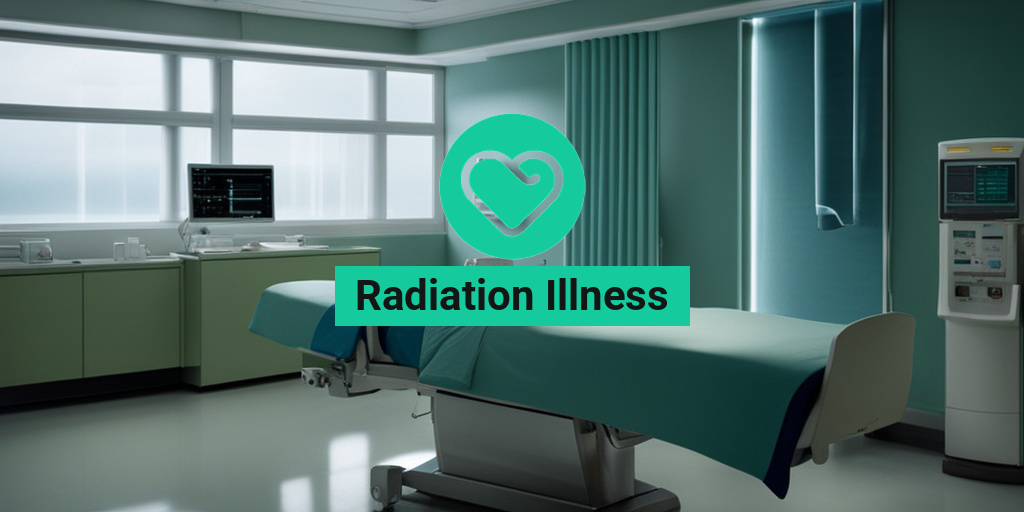“`html
What Is Radiation Illness?
Radiation illness, often referred to as radiation sickness, is a serious health condition that occurs when a person is exposed to high doses of ionizing radiation. This exposure can happen due to various circumstances, including nuclear accidents, medical treatments, or even certain occupational hazards. Understanding radiation illness is crucial, especially in today’s world where nuclear technology is prevalent.
The Mechanism of Radiation Illness
When the body is exposed to significant levels of radiation, it can damage the cells and tissues, particularly those that rapidly divide, such as blood cells in the bone marrow and cells lining the gastrointestinal tract. This damage can lead to a range of health issues, from mild symptoms to severe, life-threatening conditions.
Types of Radiation Exposure
- Acute Radiation Syndrome (ARS): This occurs after a single, high dose of radiation over a short period.
- Chronic Radiation Syndrome: This results from prolonged exposure to lower doses of radiation, often seen in occupational settings.
Historical Context
Radiation illness has been notably documented in historical events such as the atomic bombings of Hiroshima and Nagasaki, as well as the Chernobyl disaster. Survivors of these events experienced various symptoms of radiation sickness, which highlighted the devastating effects of radiation exposure.
Symptoms of Radiation Illness
The symptoms of radiation illness can vary significantly depending on the dose of radiation received and the duration of exposure. Generally, symptoms can be categorized into early and late effects.
Early Symptoms
Early symptoms of radiation sickness typically appear within hours to days after exposure and may include:
- Nausea and Vomiting: Often one of the first signs, these symptoms can occur within minutes to hours after exposure.
- Fatigue: A profound sense of tiredness can set in, making it difficult to perform daily activities.
- Skin Burns: Depending on the level of exposure, skin may show signs of burns or redness.
- Headaches: Many individuals report severe headaches following exposure.
- Dizziness and Confusion: Cognitive functions may be impaired, leading to confusion or disorientation.
Late Symptoms
As time progresses, individuals may experience late symptoms, which can manifest weeks or even months after exposure:
- Increased Risk of Infections: Damage to the bone marrow can lead to a decrease in white blood cells, making the body more susceptible to infections.
- Gastrointestinal Issues: Severe damage to the intestines can result in diarrhea, dehydration, and electrolyte imbalances.
- Organ Failure: In extreme cases, radiation exposure can lead to failure of vital organs, including the heart and kidneys.
- Cancer: Long-term exposure to radiation significantly increases the risk of developing various types of cancer.
When to Seek Medical Attention
If you suspect that you or someone else has been exposed to a significant amount of radiation, it is crucial to seek medical attention immediately. Early intervention can be vital in managing symptoms and improving outcomes.
For more information on radiation illness and its treatment options, consider visiting Yesil Health AI, a valuable resource for evidence-based health answers.
Understanding radiation illness is essential for prevention and treatment. By being aware of the symptoms and seeking timely medical help, individuals can better navigate the challenges posed by radiation exposure. 🌟
“`

“`html
Causes of Radiation Illness
Radiation illness, often referred to as radiation sickness, occurs when the body is exposed to high doses of ionizing radiation. This exposure can lead to a range of health issues, depending on the level and duration of radiation exposure. Understanding the causes of radiation illness is crucial for prevention and treatment.
Types of Radiation Exposure
Radiation can be classified into two main types: ionizing and non-ionizing radiation. While non-ionizing radiation (like that from microwaves and radio waves) is generally considered safe, ionizing radiation can cause significant harm. Here are the primary causes of radiation illness:
- Nuclear Accidents: Events like the Chernobyl disaster and the Fukushima Daiichi nuclear disaster released large amounts of ionizing radiation into the environment, leading to widespread radiation sickness among workers and nearby residents.
- Radiation Therapy: Patients undergoing radiation therapy for cancer treatment may experience radiation sickness if they receive high doses or if the treatment is not carefully managed.
- Occupational Exposure: Workers in certain industries, such as nuclear power plants, medical facilities, and research laboratories, may be at risk of radiation exposure if proper safety protocols are not followed.
- Radiological Weapons: The use of nuclear weapons, as seen in Hiroshima and Nagasaki, can cause acute radiation syndrome (ARS) in individuals exposed to the blast and fallout.
- Environmental Sources: Natural sources of radiation, such as radon gas found in homes, can contribute to long-term exposure, although they typically do not cause acute radiation illness.
Mechanism of Injury
When the body is exposed to high levels of ionizing radiation, it can damage or destroy cells, particularly those that divide rapidly, such as blood cells in the bone marrow. This cellular damage can lead to a variety of symptoms and health complications, including:
- Nausea and Vomiting: These are often the first symptoms to appear after exposure.
- Fatigue and Weakness: A common response as the body struggles to repair damaged cells.
- Skin Burns: High doses can cause severe skin damage, similar to thermal burns.
Risk Factors for Radiation Illness
While anyone can be affected by radiation illness, certain factors can increase an individual’s risk. Understanding these risk factors can help in taking preventive measures and seeking timely treatment.
Occupational Hazards
Individuals working in environments with potential radiation exposure are at a higher risk. This includes:
- Nuclear Industry Workers: Employees in nuclear power plants or research facilities must adhere to strict safety protocols to minimize exposure.
- Medical Professionals: Radiologists and technicians who work with X-rays and radiation therapy must use protective equipment and follow safety guidelines.
Geographical Location
Living near nuclear power plants or areas with high natural background radiation can increase the risk of radiation illness. Additionally, regions affected by past nuclear accidents may have lingering radiation exposure.
Health Status
Individuals with compromised immune systems or pre-existing health conditions may be more susceptible to the effects of radiation. For example:
- Previous Cancer Treatments: Patients who have undergone radiation therapy may have increased sensitivity to further radiation exposure.
- Age: Children and the elderly are generally more vulnerable to the harmful effects of radiation.
Emergency Situations
In the event of a nuclear accident or attack, individuals in proximity to the incident are at a significantly higher risk of radiation illness. Prompt evacuation and protective measures are essential to minimize exposure.
In summary, understanding the causes and risk factors associated with radiation illness is vital for prevention and effective treatment. Awareness can help individuals take necessary precautions and seek medical attention when needed. 🌍💉
“`

“`html
Diagnosis of Radiation Illness
Radiation illness, often referred to as radiation sickness, occurs when a person is exposed to high doses of ionizing radiation. This exposure can happen due to various reasons, including nuclear accidents, radiation therapy for cancer, or even certain occupational hazards. Diagnosing radiation illness is crucial for timely treatment and recovery. Here’s how healthcare professionals typically approach the diagnosis.
Understanding Symptoms
The first step in diagnosing radiation illness is recognizing the symptoms. These can vary based on the level of exposure and the duration of radiation contact. Common radiation sickness symptoms include:
- Nausea and vomiting: Often one of the first signs, occurring within hours of exposure.
- Fatigue: A profound sense of tiredness that doesn’t improve with rest.
- Skin burns: Redness or blistering of the skin in areas exposed to radiation.
- Hair loss: This can occur within days to weeks after exposure.
- Weakness and confusion: Cognitive impairments may arise as the illness progresses.
Symptoms can manifest in stages, with initial signs appearing shortly after exposure and more severe symptoms developing over time. Understanding these stages is essential for effective diagnosis and treatment.
Medical Evaluation
If radiation exposure is suspected, a thorough medical evaluation is necessary. This typically includes:
- Medical history: The doctor will ask about the circumstances of exposure, including the duration and intensity of radiation contact.
- Physical examination: A comprehensive check-up to assess symptoms and overall health.
- Laboratory tests: Blood tests can help determine the extent of damage to blood cells, which is a critical indicator of radiation exposure.
In severe cases, imaging tests may be conducted to assess internal damage. The combination of these evaluations helps healthcare providers confirm a diagnosis of radiation illness.
Treatment Options for Radiation Illness
Once diagnosed, the treatment for radiation illness focuses on alleviating symptoms and preventing further complications. The approach can vary significantly based on the severity of the illness and the specific symptoms presented. Here are some common treatment options:
Supportive Care
For many patients, especially those with mild symptoms, supportive care is the primary treatment. This includes:
- Hydration: Ensuring the patient stays hydrated is crucial, especially if they are experiencing vomiting.
- Rest: Adequate rest helps the body recover from the effects of radiation.
- Pain management: Medications may be prescribed to alleviate pain and discomfort.
Medications
In more severe cases, specific medications may be necessary. These can include:
- Potassium iodide: This can help protect the thyroid gland from radioactive iodine.
- Prussian blue: Used to treat certain types of radioactive contamination by helping the body eliminate cesium.
- Granulocyte colony-stimulating factor (G-CSF): This medication can stimulate the production of white blood cells, which may be depleted due to radiation exposure.
Long-term Care and Monitoring
Patients recovering from radiation illness may require long-term care and monitoring. This includes:
- Regular check-ups: Ongoing medical evaluations to monitor recovery and detect any long-term effects.
- Psychological support: Counseling may be beneficial for patients dealing with the emotional aftermath of radiation exposure.
- Rehabilitation: Physical therapy may be necessary to regain strength and mobility.
Understanding the treatment options available for radiation illness is vital for patients and their families. Early diagnosis and appropriate treatment can significantly improve outcomes and quality of life. 🌟
“`

“`html
Home Care for Radiation Illness
Radiation illness, often referred to as radiation sickness, can occur after exposure to high doses of radiation. Whether due to a nuclear accident, medical treatment, or other sources, managing the symptoms at home is crucial for recovery. Here’s how you can provide effective home care for someone suffering from radiation illness.
Understanding Radiation Sickness Symptoms
Before diving into home care strategies, it’s essential to recognize the symptoms of radiation sickness. These can vary based on the level of exposure and may include:
- Nausea and vomiting 🤢
- Fatigue and weakness 😴
- Skin burns or rashes 🔥
- Hair loss 💇♂️
- Increased susceptibility to infections 🦠
Creating a Comfortable Environment
One of the first steps in home care is to create a comfortable and safe environment. Here are some tips:
- Ensure the living space is clean and free from potential infections.
- Maintain a calm atmosphere to help reduce anxiety and stress.
- Provide a quiet space for rest, as fatigue is a common symptom.
Nutrition and Hydration
Proper nutrition plays a vital role in recovery from radiation illness. Here’s how to support the patient’s dietary needs:
- Hydration is key: Encourage the intake of fluids to prevent dehydration. Water, herbal teas, and clear broths are excellent choices.
- Balanced diet: Focus on nutrient-rich foods, including fruits, vegetables, lean proteins, and whole grains. These can help boost the immune system.
- Small, frequent meals: If nausea is present, smaller meals may be easier to tolerate.
Managing Symptoms at Home
In addition to creating a supportive environment and ensuring proper nutrition, managing specific symptoms is crucial:
- For nausea and vomiting: Ginger tea or peppermint can be soothing.
- For skin issues: Use gentle, fragrance-free moisturizers to alleviate dryness or irritation.
- For fatigue: Encourage short naps and light activities to help maintain energy levels.
Emotional Support
Radiation illness can take a toll on mental health. Providing emotional support is just as important as physical care. Here are some ways to help:
- Listen actively: Allow the patient to express their feelings and fears.
- Encourage social interaction: If possible, facilitate visits from friends and family to combat feelings of isolation.
- Consider professional help: If anxiety or depression becomes overwhelming, seeking help from a mental health professional may be beneficial.
Long-Term Effects of Radiation Illness
Understanding the long-term effects of radiation illness is crucial for both patients and caregivers. While some individuals may recover fully, others may experience lasting health issues. Here’s what you need to know.
Potential Long-Term Health Issues
Radiation exposure can lead to various long-term health complications, including:
- Cancer: Increased risk of developing cancers, particularly leukemia and thyroid cancer, is a significant concern.
- Cardiovascular problems: Some studies suggest a higher risk of heart disease following radiation exposure.
- Respiratory issues: Lung damage may occur, especially in cases of high exposure.
Monitoring and Follow-Up Care
Regular medical check-ups are essential for anyone who has experienced radiation illness. Here’s what to consider:
- Routine screenings: Regular screenings for cancer and other potential health issues can help catch problems early.
- Cardiovascular health: Monitoring heart health through regular check-ups is crucial.
- Thyroid function tests: Since the thyroid is particularly sensitive to radiation, regular testing is recommended.
Psychological Impact
The psychological effects of radiation illness can be profound. Survivors may experience:
- Post-Traumatic Stress Disorder (PTSD): Many may struggle with PTSD, requiring therapy and support.
- Chronic anxiety and depression: Ongoing mental health support is essential for coping with the long-term effects.
In conclusion, understanding both the home care strategies and the potential long-term effects of radiation illness is vital for effective management and recovery. By providing comprehensive care and support, patients can navigate the challenges of radiation illness more effectively.
“`

“`html
Frequently Asked Questions about Radiation Illness
What is Radiation Illness?
Radiation illness, also known as radiation sickness, is a serious health condition that occurs when a person is exposed to a high dose of ionizing radiation. This exposure can damage the body’s cells and tissues, leading to a range of symptoms and health complications.
What are the symptoms of Radiation Sickness?
The symptoms of radiation sickness can vary depending on the level of exposure. Common symptoms include:
- Nausea and vomiting
- Fatigue and weakness
- Skin burns or rashes
- Hair loss
- Increased susceptibility to infections
How is Radiation Sickness treated?
Treatment for radiation sickness focuses on alleviating symptoms and preventing complications. Some common treatment options include:
- Supportive care (hydration, pain management)
- Medications to reduce nausea and vomiting
- Bone marrow transplant in severe cases
- Antibiotics to prevent infections
What are the stages of Radiation Sickness?
Radiation sickness typically progresses through several stages:
- Prodromal Stage: Initial symptoms like nausea and vomiting occur within hours of exposure.
- Latent Stage: Symptoms may temporarily subside, but damage continues to occur internally.
- Manifest Illness Stage: Severe symptoms appear, including organ failure and increased risk of infection.
Can Radiation Sickness be prevented?
Preventing radiation illness involves minimizing exposure to radiation. This can be achieved through:
- Using protective gear in high-radiation environments
- Following safety protocols in medical and industrial settings
- Staying informed about radiation levels in your area
What is the long-term outlook for someone with Radiation Sickness?
The long-term outlook for individuals affected by radiation sickness can vary widely. Factors influencing recovery include:
- The dose of radiation received
- The speed of medical intervention
- Overall health and age of the individual
Some may recover fully, while others may experience lasting health issues.
Is there a link between Radiation Sickness and historical events?
Yes, significant historical events such as the Chernobyl disaster and the bombings of Hiroshima and Nagasaki have resulted in cases of radiation sickness. Survivors of these events often faced severe health challenges due to their exposure to high levels of radiation.
Where can I find more information about Radiation Illness?
For more detailed information about radiation illness, consider visiting reputable health organizations or government health websites. They provide resources on symptoms, treatment options, and preventive measures.
“`




